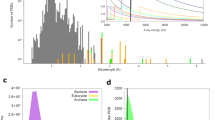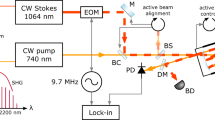Abstract
I HAVE been investigating the Raman effect in a number of crystals, using the same method of excitation which proved to be particularly successful with gases.1 The primary source consists of a powerful water-cooled mercury arc, which gives an extremely intense and sharp resonance line λ2537. The advantages of this method are: (1) the ratio of the intensity of the line λ2537 to the other mercury lines in the ultra-violet is so large that in a spectrogram of moderate exposure all the Raman lines are excited by the former radiation ; (2) a short exposure is required (10 minutes to three hours) ; (3) a wide range of frequency shifts is available (about 20,000 cm.–1) ; (4) the exciting radiation can be easily absorbed by a filter of mercury vapour between the substance and the photographic plate, thus allowing the observation of modified frequencies in the immediate neighbourhood of the primary line.
This is a preview of subscription content, access via your institution
Access options
Subscribe to this journal
Receive 51 print issues and online access
$199.00 per year
only $3.90 per issue
Buy this article
- Purchase on Springer Link
- Instant access to full article PDF
Prices may be subject to local taxes which are calculated during checkout
Similar content being viewed by others
References
Phys. Rev. 34, 367; 1929. Zeits. f. Phys., 61, 598; 1930. ibid., 66, 646; 1930.
Author information
Authors and Affiliations
Rights and permissions
About this article
Cite this article
RASETTI, F. Raman Spectra of Crystals. Nature 127, 626–627 (1931). https://doi.org/10.1038/127626a0
Issue Date:
DOI: https://doi.org/10.1038/127626a0
This article is cited by
-
Fluorescence Lines in the Spectrum of Light Scattered by Calcite
Nature (1952)
-
Raman spectrum of fluorspar and its temperature variation
Proceedings of the Indian Academy of Sciences - Section A (1950)
-
Raman Spectrum of Rocksalt
Nature (1949)
-
Raman Spectrum of Rock-Salt Under High Resolution
Nature (1947)
-
The Raman spectrum of rocksalt and its interpretation
Proceedings of the Indian Academy of Sciences - Section A (1947)
Comments
By submitting a comment you agree to abide by our Terms and Community Guidelines. If you find something abusive or that does not comply with our terms or guidelines please flag it as inappropriate.



